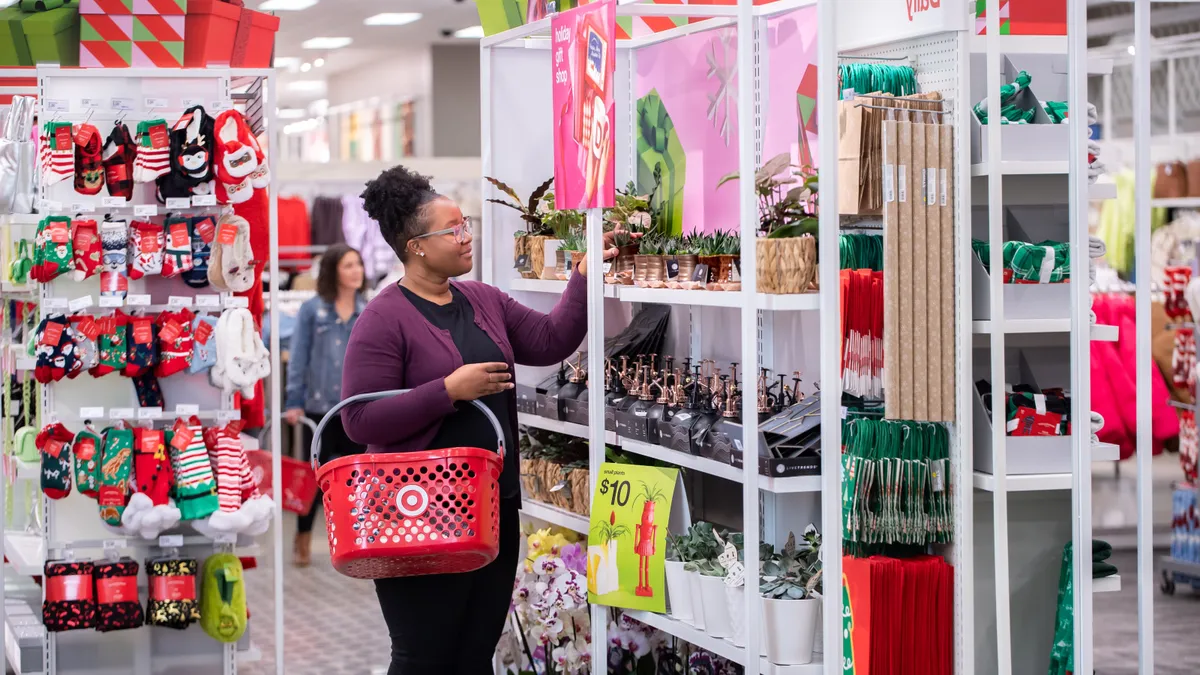Over the past several years, the timing of holiday deals has been pulled forward to start earlier in the season.
Amazon, Target and Walmart even pegged their recent fall sales events as the kickoff to the holiday season. And this year, the early arrival of holiday sales might be more critical as retailers grapple with fewer selling days between Black Friday and Christmas Day.
Despite Black Friday falling later on the calendar, the overall season is still expected to result in big sales for retailers. The National Retail Federation expects retail sales in November and December to rise between 2.5% and 3.5% compared to last year, reaching up to $989 billion. Other firms have predicted similar increases, with Deloitte projecting sales to grow by up to 3.3% year over year and Forrester anticipating sales to grow 3.7%.
Here’s a look at how retailers — and consumers — are preparing for a shorter holiday season.
Early deals
Like years past, major retailers kicked off their holiday promotions weeks before Halloween.
In what started as a postponed Prime Day during the height of the pandemic, Amazon and others have routinely scheduled sales events during October to encourage consumers to start their shopping early.
“For retailers, they are going to start the holiday early … sales start to come earlier and earlier, and they're going to have to be aggressive in making sure they get out there and get their first stab at shoppers’ money as quickly as they can,” Michael Brown, a partner and Americas retail leader at Kearney, said by phone. “They're going to have to be more aggressive to bring the masses out to the stores and the websites in the days that they do have, especially around the weekends.”
And customers are responding. Thirty-two percent of U.S. shoppers planned to start their holiday shopping between July and October, according to a September survey from Gartner. And more than a quarter of respondents said they’d start in November.
“Consumers have been shopping sooner and October sales are expected to reflect this,” Howard Meitiner, managing director at Carl Marks Advisors, said in an email. “The holiday season is now a three-month event.”
The sales have continued throughout the season with Amazon bringing back its annual beauty sale, Walmart introducing a host of deal days through Cyber Monday and Target launching an early Black Friday sale.
This year offers the shortest length of time between Black Friday and Christmas Day in five years, with only 26 days between the holidays — and Cyber Monday occurring in December this year. That may not be top-of-mind for shoppers, though.
“Consumers do not think in terms of the number of shopping days, because there are plenty of days for them to make their purchases,” Meitiner said. “There will simply be more concentration of spending as consumers use the days available to make their purchases.”
Black Friday’s purpose
For years, Black Friday was seen as the time to get the biggest deals of the season. The day was filled with scenes of shoppers lined up outside of stores looking to check key items off their holiday shopping lists.
But Black Friday may not carry the same weight as in the past.
With sales starting earlier, Kearney’s Brown described the period as, “‘Orange Friday’ as opposed to Black Friday because it does seem like the minute October passes us by, the sales will start.”
While Black Friday itself will still see doorbusters on specific categories, like big-ticket items in electronics, for other categories, consumers are price-savvy enough now to know when to pull the trigger on purchases, regardless of when they go on sale during the season, according to Brown.
“I see, in the industry, Black Friday being a shopping holiday, not necessarily the absolute best bargains available,” he said.
In terms of where consumers will shop, it’ll be spread across channels. Over three-quarters of consumers said they would do more than half of their holiday shopping online this year, according to an October Bain & Company survey of shoppers in the U.S., the U.K., Germany, Australia and other countries. But other research suggests stores remain important: About half of consumers plan to shop in stores this holiday, according to an Experian report from last month. Among cohorts, baby boomers are the most likely to shop in stores, followed by Gen X, millennials and then Gen Z.
“I think consumers are set in their ways,” Brown said. “Those who want to shop stores — to be able to touch, feel, compare products [and] to actually enjoy in some ‘shopper-tainment’ — will go shop in the stores. Those items that are really just brand name, specific items, where I can click and have it delivered and know exactly what I'm getting, will shop in mass online.”
But as the season progresses — and delivery windows get smaller — consumers may opt to shop in stores.
“With fewer days between Black Friday and Christmas, retailers will face increased pressure to ensure timely delivery, offer additional discounts, and adjust inventory levels,” said Darpan Seth, CEO of Nextuple, an omnichannel order management advisory and technology firm.
Retailers’ response
Aside from rolling out early holiday promotions, retailers should be adapting various strategies like offering seamless shopping experiences across multiple channels, improving inventory management, enhancing logistics and fulfillment to ensure timely deliveries and using personalized marketing, Seth said via email.
On the marketing front, several retailers, including Old Navy, Foot Locker and Macy’s, have already introduced their holiday campaigns. And with the election over, those efforts will likely be heightened as high ad prices come down, experts said. Spending during the 2024 election period caused some brands to find alternatives — like Amazon and other retail media networks — as the cost to reach 1,000 viewers surged in channels like TV, according to EMarketer.
As for the election itself, the outcome is unlikely to impact consumer behavior, according to Meitiner, adding that it’s “possible, given the anger and divisiveness of this election cycle, that consumers may be glad it’s over, which could lead to increased focus on making this holiday season more uplifting within their family group.”
Instead, economic factors like inflation and interest rates could have a bigger impact on consumer sentiment, Seth added. Still, retailers are expected to have a strong finish to the year, despite Black Friday falling late in the season.
“Tradition and history has shown each year, the holiday shopping season is a little bigger than the year before,” Brown said. “So I think we can count on a robust season of consumers out there shopping and making sure that they enjoy their holiday and then they'll deal with their credit card bills in January.”























